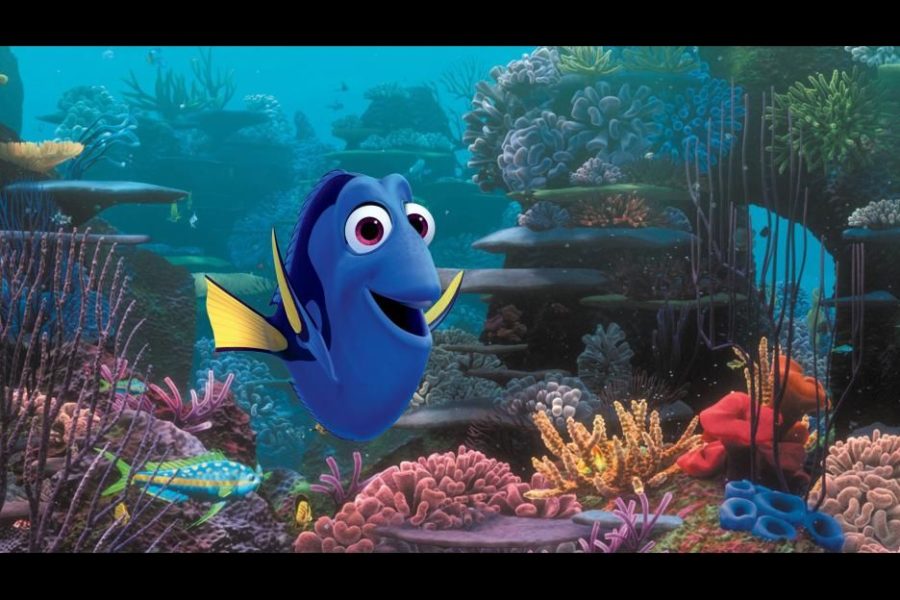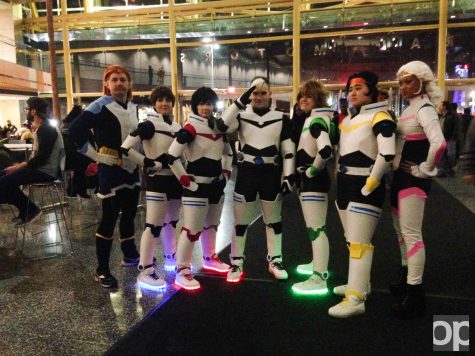Q&A: “Finding Dory” director talks about returning to the ocean 13 years later
Finding Nemo is widely considered one of Disney/Pixar’s beloved classics and after 13 years of waiting, fans will finally get a sequel with this June’s Finding Dory. Director Andrew Stanton spoke to college journalists from around the country about the film’s new characters, Ellen DeGeneres’ role in getting the film made, and the future of Pixar.
Question: I was just wondering what was it like returning to this world? Especially knowing how big the impact the first one made on so many people.
Andrew Stanton: Um, the funny thing is that we go off and we make other movies that take like four years each, and we just kind of forget how much time has passed, so it took me a while, I think, once I was actually starting to make it, about 2012, I think we were a good six months maybe a year or two before I realized, wait a minute, all the people that liked this movie are 13 years older and they’re probably in college now or they’re parents, and it didn’t dawn on me that like wow, it’s gonna be a whole different class of an audience coming to this movie. We knew how hard it was like to make the first one, and four years of work, you have to make sure it’s something that you love telling so much that you, even when it’s not working on year three, you’re still gonna get out of bed and work on it. So we had to make sure that this idea was the same.
Question: Will we be meeting any new characters in Finding Dory?
Andrew Stanton: Yes! You’ll be meeting a lot [LAUGHS], a whole slew, um, ’cause that’s half the fun. The ocean is a huge place. There’s so many other species. There’s so many other locations it’s kind of almost infinite. The hard part was kind of pairing it down to what would be our favorite types of species to have, but probably our main one that maybe people have now seen in the trailers and photos of is Hank, the octopus, which is a kind of a creature that we could have never done in the first movie. Ah, but now, technology will let us. He still almost broke the bank and we got a Beluga Whale, Bailey. We’ve got Destiny the whale shark. We’ve got a lot of natural sea life that’s around the California coast. You’ve got Sea Lions, your Otters, your loons, so even though we’re going back to a lot of familiar characters, we’ve really broadened the glossary.
Question: What were the biggest challenges or opportunities that you saw in approaching this film? And did you target it towards students that would have seen it, you know, when they were little? Did you target it towards them, or are you keeping it sort vague, sort of G-rated?
Andrew Stanton: So the truth is, I can only speak for myself, but I’ve never targeted for anybody. I’ve just written things that I would want to see and I think I’m just immature enough that it allows all ages. But, I really respect when I’m listening to music or see artwork or reading a book from another artist, I don’t necessarily want them to second guess what I want. I’m more interested in what their take is, what they’re looking for and if they introduce stuff that I would have never thought of. So I want to be respectful the same way back and just do something that I would just find really enjoyable to me and a lot of my peers that I work with. And we’re our own toughest audience. We figure if we can get past us, then there’s a good chance other people will like it. But as far as challenges for like 13 years later, I think I underestimated how difficult Dory is to write for. She was billed to be a supporting character, to make the other people look good, and putting her in the spotlight and making her the main character with short term memory loss proved to be very difficult, very difficult, to write for. And I started to hate the person that came up with her, which was me.
Question: Ellen appears to be very passionately excited about her role as Dory. What is it like, working with Ellen, and how did Ellen become the role of Dory?
Andrew Stanton: Well, I’ll talk about what it’s like working with her. Andrew will speak about it, about how did she get into the role. To begin, with Ellen and Dory you don’t separate the two. And certainly not trying anything different on this film, like there was no kind of thought about doing Dory without Ellen, but it was nice that she kept saying she was on board for the last 12 years on her show, so we kind of felt like we had a good chance that she was going to be up for it. But then, Ellen’s humor and her acting is so much in her delivery, in how she says the most kind of mundane line. It’s just been a charm and kind of a genuine, kind of wisdom and kind of approachability in the way she delivers a line that, I think for us it’s gold, so every time we got to sit down and work with Ellen on a recording session, we had quite a few on this film, God bless her, she worked with us from almost the very beginning and recorded a ton…
Well, you know Dory would never have existed had I not heard Ellen on TV once, and this was maybe before you guys’ time, but in the late ’90’s she was in a sitcom, that was actually also called the Ellen Show, and I was in the middle of starting to write this movie that I didn’t even know was going to be called Finding Nemo at the time. It was just this fish movie and I read somewhere the fact that gold fish have a memory of three seconds, and I thought that was hilarious, and I wanted to come up with a character with short term memory loss, but I couldn’t figure out how to write it without it being kind of annoying or repetitive.And then I happened to have the TV on and I heard her on her show change the subject of sentence five times. And the way she did it, which we’re all familiar with now, was so special it completely opened my eyes and I got out of my writer’s block. And then I couldn’t imagine writing anybody but her doing the voice, which you shouldn’t do because what if she says no. And basically that was my pitch. I wrote the movie and I sent her the script and I called her and I said, “Hi, Ellen. I wrote this part for you and if you don’t take it, I’m screwed.” And she said, “Oh, then I better take it.” And that’s how it all started.
Question: What kind of response you hope the audience will have for this film, especially in terms of, you know, finding identity and protecting the oceans?
Andrew Stanton: Well it’s the same thing after the first movie, I grew up by the ocean. I just thought it would be a fascinating place to talk about life issues because it such a living thing and it represents sort of both life and death and it’s something that’s very beautiful and you’re afraid of it at the same time. So I wasn’t even thinking about it from that an ecological standpoint at the time. But I learned to really appreciate all the concerns and issues, even after the first movie, about the erosion of coral reefs and things.
So I went into this one with a little bit, what kind of past also, and climate change has become much more of issue that everybody is aware of. And so the whole issue of conservation, I’ve worried about it. I didn’t want to come across preachy or anything like that, and I don’t think anybody wants me preaching when they’re watching movies, but it matters if you, I think you’re more successful if you care for the characters, you care for the story. So I think we managed to make basically include conservation and the respect for sea life and taking care of nature as part of the actual narrative of the story. So I think we integrated it really well this time, without it coming across as preachy or anything like that.
I think basically identity, whenever I’m writing I kind of smell what I think that I want the movie to be about, but I’m not sure and the more we explore, then we get to refine and it’s like being on a therapy couch and you kind of realize oh, this is what I really care about. And I realize that I felt that Dory saw her short-term memory loss as a burden, or as a handicap, and we love her for it. But, I wanted her to see and like herself as much as the rest of the world liked her and all the other characters in the movie, and I realized that it’s a bit of a metaphor for everybody.
Everybody has something about them that’s not perfect, maybe they put themselves down on, but it’s actually what’s making you special and unique, and you learn as you grow older to own that part of yourself and to embrace it, and know that’s what makes you different than somebody else in a good way. As so with this sort of expression of self-confidence, of discovering sort of a self-confidence, that we realize that’s we are saying with the movie.
Question: So since you have been a part of Pixar since the very beginning, what do you believe is in store for Pixar after this sequel, I mean, the Toy Story sequels and The Incredibles?
Andrew Stanton: Well I think it’s really hard to say. I mean, I’m always aware of sort of thinking about the next five, six years down the line, but as far as like anything wider than that, I know we’re a little boring in the sense that we’re not trying to break new ground technology wise, but story wise, we’re always trying to surprise ourselves. I guess what’s been fascinating for me is now that we’ve grown larger and we put a larger pool of talent that’s coming up with movies and there’s so much more animation out there in world, and has been for at least the last 10 or 15 years, I spend a lot of my time thinking what is left to say in animation, what is left to see. And I’m always pleasantly surprised, not by just other animated movies but, what in-house people come up with. I go my gosh, I didn’t even think of that, and I think that’s part of what I love about it, is just the surprise factor that, that I can’t predict what’s gonna come next, but all I hope and know is when it comes out of Pixar, that we’ll try our darndest to make it as engaging of a story as all the other ones. But hopefully everything else breaks the rule books. But there’s no big strategy. I mean, I hate to say it, but there’s nobody really flying the flame. We’re sort of making it up as we go along.
Finding Dory is in theaters June 17 and is not yet rated.




